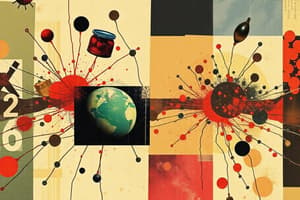Podcast
Questions and Answers
What are antioxidants?
What are antioxidants?
- Molecules that prevent or slow down the damage caused by free radicals. (correct)
- Molecules that degrade organic compounds.
- Molecules that are added to industrial products.
- Molecules that cause oxidative stress in the body.
Which of the following is a common antioxidant?
Which of the following is a common antioxidant?
- Vitamin C (correct)
- Vitamin B
- Vitamin D
- Vitamin K
What is glutathione?
What is glutathione?
- A type of vitamin
- A synthetic antioxidant
- A type of polyphenol
- A cysteine-containing peptide found in most forms of aerobic life. (correct)
What is the most studied form of vitamin E?
What is the most studied form of vitamin E?
What is the Fenton reaction?
What is the Fenton reaction?
Which enzymes protect cells against oxidative stress?
Which enzymes protect cells against oxidative stress?
Where are polyphenols commonly found?
Where are polyphenols commonly found?
What is the Beta-Carotene and Retinol Efficacy Trial (CARET) study?
What is the Beta-Carotene and Retinol Efficacy Trial (CARET) study?
Do antioxidant supplements reduce muscle soreness after exercise?
Do antioxidant supplements reduce muscle soreness after exercise?
Flashcards
Antioxidants
Antioxidants
Molecules that prevent or slow down damage caused by free radicals, which can cause oxidative stress in the body.
Oxidative stress
Oxidative stress
A type of damage caused by free radicals, which are highly reactive molecules that can damage cells and contribute to aging and disease.
Vitamin E
Vitamin E
A set of eight related tocopherols and tocotrienols, fat-soluble vitamins with antioxidant properties, with α-tocopherol being the most studied.
Glutathione
Glutathione
Signup and view all the flashcards
Oxidation
Oxidation
Signup and view all the flashcards
Polyphenols
Polyphenols
Signup and view all the flashcards
Glutathione
Glutathione
Signup and view all the flashcards
Superoxide dismutases (SODs), Catalases, Peroxiredoxins
Superoxide dismutases (SODs), Catalases, Peroxiredoxins
Signup and view all the flashcards
Beta-Carotene and Retinol Efficacy Trial (CARET)
Beta-Carotene and Retinol Efficacy Trial (CARET)
Signup and view all the flashcards
Study Notes
Antioxidants prevent oxidation, a chemical reaction that produces free radicals and leads to degradation of organic compounds, including living matter.
Antioxidants are added to industrial products, such as fuels, polymers, and lubricants, to extend their usable lifetimes.
Antioxidants are used as food additives to prevent food spoilage, particularly the rancidification of oils and fats.
Antioxidants are added to cosmetics to prevent rancidity and reduce oxidative stress from sun exposure.
Antioxidants can be added to polymers such as rubbers and plastics to prevent degradation that causes a loss of strength and flexibility.
Synthetic phenolic and aminic antioxidants have potential human and environmental health hazards.
Reactive oxygen species produced in cells can damage cells by starting chemical chain reactions such as lipid peroxidation, or by oxidizing DNA or proteins.
Uric acid is the highest concentration antioxidant in human blood and provides over half of the total antioxidant capacity of human serum.
Vitamin C is a redox catalyst that reduces and neutralizes reactive oxygen species such as hydrogen peroxide.
Glutathione is a cysteine-containing peptide found in most forms of aerobic life that can prevent damage from oxidative stress.Antioxidants: Types, Functions, and Health Research
- Antioxidants are molecules that prevent or slow down the damage caused by free radicals which can cause oxidative stress in the body.
- Common antioxidants include vitamins A, C, and E, and polyphenols, which are extensively metabolized by catechol-O-methyltransferase, which methylates free hydroxyl groups, and thereby prevents them from acting as antioxidants in vivo.
- Glutathione is one of the most important cellular antioxidants, as it reduces other metabolites and enzyme systems, such as ascorbate in the glutathione-ascorbate cycle, glutathione peroxidases and glutaredoxins, as well as reacting directly with oxidants.
- Vitamin E is a set of eight related tocopherols and tocotrienols, which are fat-soluble vitamins with antioxidant properties, with α-tocopherol being the most studied as it has the highest bioavailability.
- The relative importance of the various forms of vitamin E is presently unclear, and it has even been suggested that the most important function of α-tocopherol is as a signaling molecule, with this molecule having no significant role in antioxidant metabolism.
- Antioxidants that are reducing agents can also act as pro-oxidants, such as vitamin C, which can reduce oxidizing substances such as hydrogen peroxide but also reduce metal ions such as iron and copper that generate free radicals through the Fenton reaction.
- Cells are protected against oxidative stress by an interacting network of antioxidant enzymes, including superoxide dismutases (SODs), catalases, and peroxiredoxins.
- The thioredoxin system contains the 12-kDa protein thioredoxin and its companion thioredoxin reductase, while the glutathione system includes glutathione, glutathione reductase, glutathione peroxidases, and glutathione S-transferases.
- Polyphenols are found in vegetables, fruits, eggs, legumes, and nuts, while vitamins A, C, and E can be destroyed by long-term storage or prolonged cooking.
- The effects of cooking and food processing are complex, as these processes can also increase the bioavailability of antioxidants, such as some carotenoids in vegetables.
- High doses of some antioxidants may have harmful long-term effects, and the Beta-Carotene and Retinol Efficacy Trial (CARET) study of lung cancer patients found that smokers given supplements containing beta-carotene and vitamin A had increased rates of lung cancer.
- Common pharmaceuticals (and supplements) with antioxidant properties may interfere with the efficacy of certain anticancer medication and radiation therapy, as radiation therapy induces oxidative stress that damages essential components of cancer cells.
- Taking antioxidant dietary supplements before or after exercise does not likely lead to a noticeable reduction in muscle soreness after a person exercises.
Studying That Suits You
Use AI to generate personalized quizzes and flashcards to suit your learning preferences.




